- Home
- F. Paul Wilson
Thy Brother's Keeper
Thy Brother's Keeper Read online
Thy Brother’s Keeper
Contents
1
2
3
4
5
6
7
8
9
10
11
12
13
14
15
16
17
18
19
20
21
22
23
24
25
26
27
28
29
30
31
32
33
34
35
Epilogue
1
MANHATTAN
DECEMBER 21
“You’re sure we’ve got the right address?” Patrick said.
He and Romy stood before a dilapidated five-story Alphabet City tenement that leaned on its neighbor like a drunk against a lamppost; a rusty fire escape laced its sooty bricks and sootier windows.
He’d figured Alice Fredericks was poor, but not this poor.
“Let’s see.” Romy checked the number on the door atop the crumbling front stoop against the paper in her hand. “Yes. This is what she wrote down. She’s in apartment 2D. I hope she’s in.”
Patrick had called Alice’s number three times this morning to make sure she was home before they made the trip. Whoever had answered the hall phone told him—with growing annoyance because he said he was waiting for another call—that “the crazy bitch ain’t answerin her door.”
Patrick rubbed his cold hands together and envied Romy’s cleathre coat. The weather wasn’t going to let anyone forget that today was the first day of winter. Near noon now but the sun hung low as a cold wind knifed down the nearly empty street.
Cold as the knot of tension in his chest. He looked around. Parked cars lined the curb; if anyone was lurking in one of them, watching, readying to spring, he couldn’t tell. Only an occasional driver passing on the street glanced their way—Romy tended to draw looks—but no one seemed unduly interested. He’d kept watch during the cab ride over and hadn’t noticed anyone following.
“This is all a waste of time, you know,” he told her. “She may have had a child at one time, and she may even have sold it, but—”
“Not just a child, according to her,” Romy corrected him. “A sim.”
“Oh, right. How did I leave that out? A baby sim she says was the result of fertilization by aliens.” He shook his head. “Who’s crazier—her, or us for coming here?”
“We’ve come this far, let’s finish it.”
“Whatever she gave birth to, we know she didn’t sell it to Mercer Sinclair, and we know she doesn’t have a SimGen check signed by him.”
“That’s just it: We don’t know. We assume, but we don’t know .”
“I do. Why are you so gung ho to call her bluff?”
“Because it will nag at me if I don’t check it out. That’s why I’m here on my lunch hour. I don’t want to keep wondering if maybe she’s only ninety percent crazy and ten percent of what she’s telling us is true. And what if that ten percent puts us on a path to ‘surge’? The Idaho license plate on that truck led to Manassas, didn’t it?”
“Point taken.” But Patrick doubted very much they’d score anything useful here. “Okay, let’s get this over with.”
He took the front steps two at a time, pushed on the front door, but it was locked. She’d said she was in 2D; he found the 2D bell button, but it was unlabeled. He pressed it anyway. No buzzer sounded to unlock the door. Tried again, but still no response.
He turned to Romy. “Are you getting a bad feeling about this?”
“She may not be in.”
“Or she may not be well. Or worse.”
“You mean that we might not be her first visitors since she left last night?”
“Yeah.”
Just then the door swung open and an anemic-looking splicer goth, twenty something and all in black, stepped out. She hissed at him, revealing a pair of long, sharp vampire fangs—the real thing, he was sure—then flowed down the steps, trailing black lace.
Patrick caught the door before it latched closed again, and held it for Romy. “After you.”
“In this case,” Romy said, “gentlemen first.”
Feeling his neck muscles bunch, Patrick took one last look at the street, then led the way up the worn stairs to the second floor where they found a narrow hallway lit by low-watt bulbs in steel cages and smelling vaguely of urine.
“Wait here,” he told Romy.
She shook her head. “You might need me.”
He noticed that she had her hand inside her bag. “What’ve you got in there?”
“Something I hope I don’t have to use.”
Listening for a click, a creak, anything that might herald an opening door, he led her to the right, past the hall phone framed by scribbled names and numbers. Finally they reached 2D. Patrick took a breath and knocked on the peeling surface. No answer. He tried again, louder.
“Alice? It’s Patrick Sullivan.”
He pressed his ear to the door and thought he heard a rustling sound within, but couldn’t be sure. Tried to look through the peephole but couldn’t see a thing, not even light.
“I don’t like this,” Romy whispered. “I told her we’d be here today. What if…” Her voice trailed off as she frowned.
Patrick knew what she was thinking. He’d been thinking it too. “You mean, what if she’s been talking too much about this check and someone finally decided to shut her up for good?”
“Which would mean she wasn’t crazy after all.”
“We’ve got to get in there.” He lowered his voice further. “What if it’s all a set up?”
Romy chewed her upper lip. “Maybe we should call the cops. Report her as a missing—”
The door suddenly swung inward, a hand darted out, grabbed the lapel of Patrick’s overcoat, and pulled him inward. He stifled a terrified cry when he recognized Alice Fredericks.
“Come in!” she hissed. “Quick!”
Patrick stepped through, Romy right behind him. Alice slammed the door as soon as they were inside, plunging them into darkness. He could make out glints of light from what seemed to be a window, but she must have left her shades down.
“Alice,” he said as his pounding heart slowed. “What’s going on? Can we have some light?”
Rustling clothing, shuffling feet accompanied by a strange crinkling noise, and then a lamp came to life. Patrick barely recognized Alice. Her gray hair was in wild disarray, her feet bare, her frayed housecoat haphazardly buttoned. And her eyes—red, swollen, wet…
“Alice,” he said. “You’ve been crying. What—?”
The words dried up as his brain began to register his surroundings.
“Oh, my,” Romy said softly at his side. She’d seen it too.
Patrick did a slow turn, his feet crinkling on the aluminum foil that lined the floor. And the walls. And the ceiling. And the two windows on the outer wall, which was why the one-room apartment was so dark. In some areas, the ceiling especially, the foil looked as if it had been collected from trash cans—minutely crinkled, in odd-sized squares, some with fast-food logos showing; other areas were covered in long smooth strips, obviously tacked up right off the roll.
“Alice?” he said. “What is all this?”
“What? Oh, you mean the foil. That’s for protection.”
“From…?”
“From having my mind read. The aliens working for Mercer Sinclair can read thoughts, you know. This protects me from them. At least…” Her voice faltered a
s her face twisted into a mask of grief. She sobbed. “At least I thought it did!”
Romy stepped closer and slipped an arm around the woman’s quaking shoulders. “What’s the matter, Alice? What happened?”
“The check!” Alice wailed. “They stole it!”
Knew it! Patrick thought. Complete waste of time.
“You mean,” Romy said, “someone broke in here and took it?”
“Yes! They knew my secret hiding place and they switched it with another check, a worthless one!”
Romy glanced up at Patrick and shrugged.
“Let’s go,” Patrick said. He wanted to be angry at this flaky lady for wasting his time, but she was too genuinely distressed. Her bizarro apartment, though, was giving him a grand case of the creeps.
“We can’t leave her like this. She’s terrified.” Romy turned back to Alice. “When did you last see the check?”
“Oh, I haven’t taken it out for years. But after talking to you last night, I pulled it out of my secret hiding place, to have it ready for Mr. Sullivan, and it had changed!” Another sob, louder this time. “The date’s the same and the money’s the same, but it’s not a SimGen check anymore and someone else’s signature is there instead of Mercer Sinclair’s!” She fumbled in her housecoat pocket. “Here. I’ll show you.”
“Romy…,” Patrick began but her quick sharp look cut him off.
“Let me calm her down a little,” she said, “then we can be on our way.”
Alice produced a slip of paper and shoved it into Romy’s hand. “There. See for yourself!”
Patrick saw Romy glance at the check, then take a closer look.
“What?” Patrick said.
Romy angled the paper back and forth in the dim light. “Well, it’s for five thousand dollars and it’s made out to Alice Fredericks. And she’s right about the signature: I don’t know whose it is, but it’s not Mercer Sinclair’s.”
“I’ll bet she’s also right about it not being from SimGen too.”
Romy nodded, still staring at the check. “Uh-huh. It was drawn on the First Federal Bank of Arlington, Virginia.” She looked up at him, her eyes so bright they fairly glowed. “From the account of something called Manassas Ventures.”
2
“I don’t get it,” Patrick said. His stomach lurched as one of the Federal Plaza elevators lifted them toward OPRR’s offices.
They’d held off talking about Alice during the ride over from Alphabet City. The odds that one of New York’s current crop of cabbies would know enough English to follow their discussion were astronomical, but still they hadn’t wanted to risk it. Now they had an elevator car to themselves.
“I think I do,” Romy said. “I think she did perform some service for SimGen in its early years, maybe even before it started calling itself SimGen. And it may well have had something to do with a baby.”
“What about the space alien angle? You’re not buying into—”
“Of course not. I’m no psychologist, but I can see how she may have felt very guilty about what she did. Combine that with not being too tightly wrapped in the first place, and you can understand someone unraveling. She structured a fantastic scenario that blended fact and fiction.”
“But Mercer Sinclair?”
“More mixing of fact and fiction,” Romy said. “Alice must have had some direct contact with him because he keeps reappearing in her story—taking the sim baby, signing her check.”
“Right. The check. Why did she think it had changed?”
“You heard her. She hadn’t looked at it for years, and during that time it did change—in her mind. Maybe Mercer Sinclair had given it to her himself. She remembered that and so over the years her loosely hinged mind substituted his signature for whoever really signed it. And since Mercer Sinclair is synonymous with SimGen, she began to remember it as a SimGen check.”
“Poor lady. I’d give anything to know the truth about her.”
“I don’t think even she knows anymore.”
He slipped an arm over Romy’s shoulders and pulled her closer. “You were good with her.”
“I felt sorry for the poor thing.”
It had taken Romy a while, but finally she’d managed to calm Alice Fredericks, telling her she was safe now: The aliens had what they wanted and so they wouldn’t be bothering her again. She could take down the foil, let some fresh air into the room, and stop worrying. Alice seemed to buy it. She hadn’t seemed quite ready yet to peel the foil from the walls, but she’d been in better spirits, and even gave them the check to take with them. After all, it wasn’t the real thing, so it was no use to her.
“How old do you think she is?” Patrick said.
“She said she was forty-seven.”
“Yeah, but is that reliable? She looks sixty.”
“Poverty and madness can age you pretty fast.”
“Yeah, well…” He sighed. “I guess there’s no way to find out what really went on between her and SimGen—or rather, the proto-SimGen being directly financed by Manassas. Which leaves us no closer finding out who’s behind Manassas.”
“But we’ve got a Manassas Ventures check, and it’s signed. That’s somebody’s signature.”
“Right.” With his free hand Patrick pulled the old check from his pocket and held it up. “A C-like letter connected to a squiggle, and then an L-like thing connected to another squiggle, on a check drawn on a Virginia bank that was no doubt gobbled up by another bank that merged with yet another bank which was taken over by still another bank.”
“But the check’s dated back when all that appropriation money was being funneled into SIRG. If we can connect SIRG to that Arlington Federal account…”
“Fat chance.”
“Don’t be so sure. I’ve got Uncle Miltie working on SIRG.”
Patrick had to laugh. “How do you get your superior to do your scut work?”
She lifted her chin defiantly. “I’ll have you know I’m superior to Milton Ware in every way.”
“Except in seniority, position, and salary, right?”
“Mere details. Besides, he’s crazy about me.”
“Aren’t we all?”
“And he’s an expert at tracking down funding. Nobody better. Knows a ton of passwords and can sniff out an unclaimed research dollar at a thousand paces. That’s how I sicced him on SIRG. I told him this group got zillions in funding without ever revealing what it was doing. Maybe if OPRR learned its secret…”
“And he bought it?”
“Why not? It’s true, isn’t it?”
“Did you tell him it hasn’t received a dime in years?”
“Of course. But I suggested that if he could find where all that funding came from, maybe some of it might still be around for OPRR to tap into.”
“And he bit?”
“Like a dog on a bone. And Milton Ware is the kind of dog who’ll work a bone until there’s nothing left.”
They reached the OPRR offices, a nondescript suite on the eighteenth floor. Romy led Patrick to a windowed office where a peppy, white-haired little man sat hunched before a computer. The plaque on his desk read MILTON WARE .
“Any luck?” she said.
The man looked up and regarded them with bright blue eyes. “Yes and no.”
After Romy made introductions, Ware took off his glasses and pointed to the inch-high stack of printouts on his desk.
“The good news is that I know where Social Impact Research Group’s money came from. The bad news is that OPRR won’t be able to get any of it.”
“Why not?” Romy said.
“Because its ultimate source was the Department of Defense.”
“Knew it!” Romy said, clapping her hands once. “Just like SOG—military bucks laundered through an innocent-sounding subagency. Any indication where the money went after it was cleared through SIRG?”
“Hell,” Patrick said, “we know damn well—” But a quick look from Romy shut him up.
Right. They both s
uspected that the money had marched through a parade of holding companies until it reached Manassas Ventures, which used it to fund the nascent SimGen. But Milton Ware knew nothing of this.
“We know it wasn’t anything legit,” Romy said, jumping in to cover for him. “Otherwise they would have been more open about the funding.”
“I don’t see why it matters,” Ware said. “It doesn’t exist anymore. No trace of it in anyone’s budget anymore.”
Patrick leaned back and thought a moment. They knew SIRG was still active—Daniel Palmer had said the name before his speech center blew a fuse. But where was it getting its funding now? The path to the answer might not lie with government agencies but with people. He’d seen it happen time and again during his labor relations practice: certain shady characters, on both the labor and management sides, would be found out and sent packing, only to pop up in another company or union local the following year.
“SIRG might be operating under a different name,” he said, “but I bet the personnel are the same. Any idea who headed SIRG?”
Ware leaned forward and put on his glasses. “Yes. I remember coming across that somewhere…” He began shuffling through his printouts. “Here it is: the director was a Lieutenant Colonel Conrad Landon.”
“And where is he now?”
“Easy enough to find out.” Ware turned to his computer. After a number of flamenco bursts on his keyboard, he leaned closer to the screen and said, “Conrad Landon retired as a full bird colonel.”
“Damn. When?”
Ware stared at the monitor. “The same year the funding died.”
“What a surprise,” Romy murmured.
Patrick leaned across the desk for a peek at Ware’s screen. “Any hint at where he might—?”
The picture of Landon startled him. Something familiar about the man in the grainy, black-and-white personnel-file photo.
“What’s up?” Romy said.
“Nothing. I just—” And then he knew. Add a few decades, enough to whiten the hair and deeply line the face, and Patrick recognized him. “Nothing.” Repressing a shout of triumph, he rose and extended his hand across the desk. Had to get out of here, had to talk to Romy alone before he exploded. “Nice meeting you, Mr. Ware. I’ve got to run. Romy, could you show me out?”

 Crisscross
Crisscross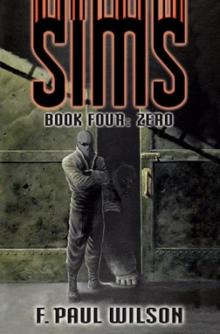 Ground Zero
Ground Zero Short Stories
Short Stories The Select
The Select Codename
Codename Bloodline
Bloodline A Soft Barren Aftershock
A Soft Barren Aftershock The Tomb
The Tomb The Complete LaNague
The Complete LaNague The Tery
The Tery Dark City
Dark City Deep as the Marrow
Deep as the Marrow The Fifth Harmonic
The Fifth Harmonic Conspiracies
Conspiracies Fear City
Fear City Wheels Within Wheels
Wheels Within Wheels Wayward Pines
Wayward Pines The Portero Method
The Portero Method All the Rage
All the Rage Infernal
Infernal The Barrens & Others
The Barrens & Others The Keep
The Keep Quick Fixes: Tales of Repairman Jack
Quick Fixes: Tales of Repairman Jack Virgin
Virgin Hosts
Hosts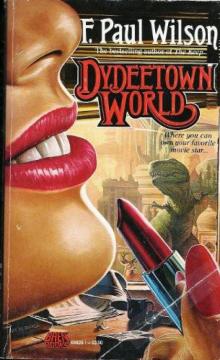 Dydeetown World
Dydeetown World Midnight Mass
Midnight Mass Black Wind
Black Wind The Christmas Thingy
The Christmas Thingy The Last Rakosh
The Last Rakosh The Last Christmas: A Repairman Jack Novel
The Last Christmas: A Repairman Jack Novel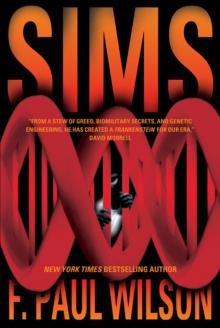 SIMS
SIMS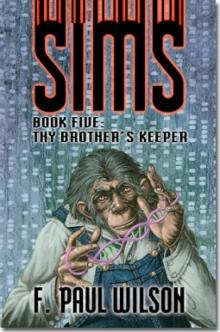 Thy Brother's Keeper
Thy Brother's Keeper Panacea
Panacea The Touch
The Touch Scenes from the Secret History
Scenes from the Secret History Scenes From the Secret History (The Secret History of the World)
Scenes From the Secret History (The Secret History of the World) Implant
Implant The Dark at the End
The Dark at the End Fatal Error
Fatal Error Wardenclyffe
Wardenclyffe Sibs
Sibs The God Gene
The God Gene The Void Protocol
The Void Protocol Artifact
Artifact The Compendium of Srem
The Compendium of Srem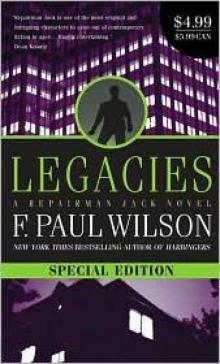 Legacies
Legacies Reprisal
Reprisal Jack: Secret Vengeance
Jack: Secret Vengeance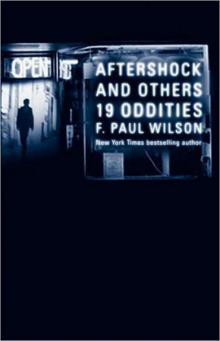 Aftershock & Others: 19 Oddities
Aftershock & Others: 19 Oddities By the Sword
By the Sword Interlude at Duane's (Thriller: Stories to Keep You Up All Night)
Interlude at Duane's (Thriller: Stories to Keep You Up All Night) Fatal Error rj-13
Fatal Error rj-13 Crisscross rj-8
Crisscross rj-8 Codename: Chandler: Fix (Kindle Worlds Novella)
Codename: Chandler: Fix (Kindle Worlds Novella) Dydeetown World lf-4
Dydeetown World lf-4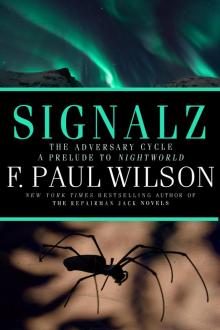 Signalz
Signalz Codename_Chandler_Fix
Codename_Chandler_Fix The Dark at the End (Repairman Jack)
The Dark at the End (Repairman Jack) The Complete Adversary Cycle: The Keep, the Tomb, the Touch, Reborn, Reprisal, Nightworld (Adversary Cycle/Repairman Jack)
The Complete Adversary Cycle: The Keep, the Tomb, the Touch, Reborn, Reprisal, Nightworld (Adversary Cycle/Repairman Jack) Repairman Jack 03 - Conspiracies
Repairman Jack 03 - Conspiracies Ground Zero rj-13
Ground Zero rj-13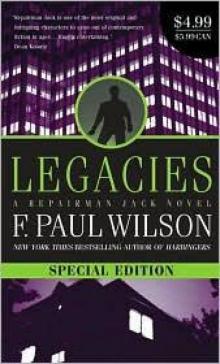 Repairman Jack 02 - Legacies
Repairman Jack 02 - Legacies The Dark at the End rj-15
The Dark at the End rj-15![Repairman Jack [02]-Legacies Read online](http://i1.bookreadfree.com/i/03/21/repairman_jack_02-legacies_preview.jpg) Repairman Jack [02]-Legacies
Repairman Jack [02]-Legacies Double Threat
Double Threat The Tery lf-5
The Tery lf-5 The God Gene: A Novel
The God Gene: A Novel Wayward Pines: The Widow Lindley (Kindle Worlds Novella)
Wayward Pines: The Widow Lindley (Kindle Worlds Novella) Reborn ac-4
Reborn ac-4 Reprisal ac-5
Reprisal ac-5 New Title 1
New Title 1 Healer lf-3
Healer lf-3 An Enemy of the State lf-1
An Enemy of the State lf-1 Interlude at Duane's
Interlude at Duane's By the Sword rj-12
By the Sword rj-12 Hardbingers rj-10
Hardbingers rj-10 Wheels Within Wheels lf-2
Wheels Within Wheels lf-2 Jack: Secret Circles
Jack: Secret Circles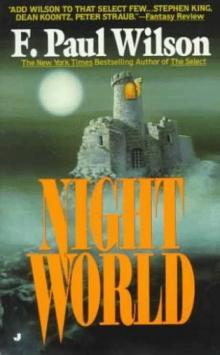 Nightworld ac-6
Nightworld ac-6 Quick Fixes - tales of Repairman Jack
Quick Fixes - tales of Repairman Jack Secret Circles yrj-2
Secret Circles yrj-2 Jack: Secret Histories
Jack: Secret Histories Haunted Air rj-6
Haunted Air rj-6 An Enemy of the State - a novel of the LaNague Federation (The LaNague Federation Series)
An Enemy of the State - a novel of the LaNague Federation (The LaNague Federation Series) Repairman Jack 05 - Hosts
Repairman Jack 05 - Hosts Cold City (Repairman Jack - the Early Years Trilogy)
Cold City (Repairman Jack - the Early Years Trilogy) The Peabody-Ozymandias Traveling Circus & Oddity Emporium
The Peabody-Ozymandias Traveling Circus & Oddity Emporium Uncommon Assassins
Uncommon Assassins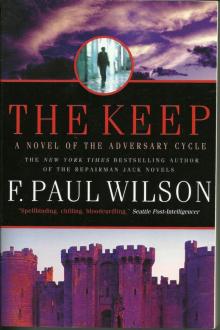 Adversary Cycle 01 - The Keep
Adversary Cycle 01 - The Keep Repairman Jack 06 - The Haunted Air
Repairman Jack 06 - The Haunted Air Bloodline rj-11
Bloodline rj-11 Ultimate Supernatural Horror Box Set
Ultimate Supernatural Horror Box Set The Keep ac-1
The Keep ac-1 Repairman Jack 04 - All the Rage
Repairman Jack 04 - All the Rage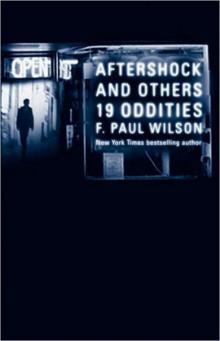 Aftershock & Others
Aftershock & Others All the Rage rj-4
All the Rage rj-4 Nightworld (Adversary Cycle/Repairman Jack)
Nightworld (Adversary Cycle/Repairman Jack)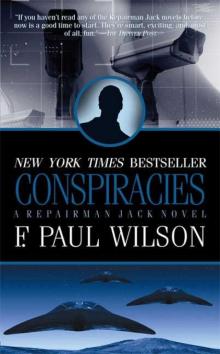 Conspircaies rj-3
Conspircaies rj-3 Hosts rj-5
Hosts rj-5 Infernal rj-9
Infernal rj-9 The God Gene: A Novel (The ICE Sequence)
The God Gene: A Novel (The ICE Sequence) Secret Histories yrj-1
Secret Histories yrj-1